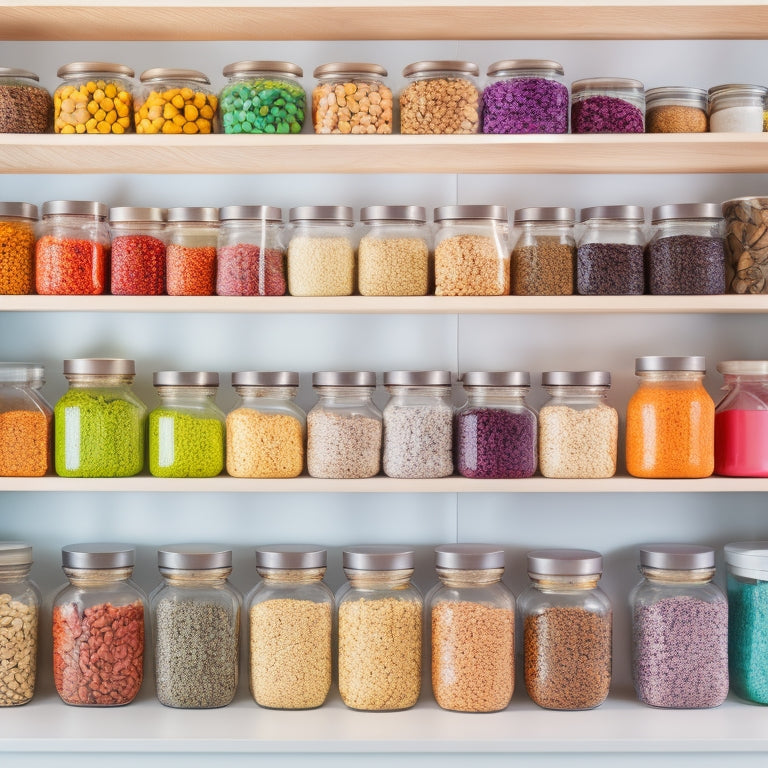
Revamp Your Cooking With Vegan Pantry Challenge
Share
You're ready to shake up your cooking routine and transform your pantry into a vegan sanctuary! Start by purging expired items and categorizing what's left. You'll discover hidden gems and forgotten favorites, and get organized with inventory templates. Next, tap into your senses to master mindful meal creation, where a single ingredient inspires a dish. Finally, adopt sustainable strategies to reduce waste, opt for eco-friendly packaging, and repurpose leftovers. As you commence on this journey, you'll open up a world of creative, nourishing, and eco-conscious cooking that will leave you feeling inspired and empowered to make a difference.
Key Takeaways
• Purge your pantry of expired, stale, or unrecognizable items to create a fresh start for your vegan cooking journey.
• Categorize and organize your remaining pantry staples to discover hidden gems and forgotten favorites.
• Select a feature ingredient to guide your cooking process, exploring flavors, textures, and aromas without relying on recipes.
• Embrace sustainable cooking strategies, such as ingredient substitution and eco-friendly packaging, to reduce waste and showcase pantry gems.
• Aim for zero waste by using every ingredient and repurposing leftovers, practicing conscious consumption and mindful meal mastery.
Pantry Purge and Prep
Examine your pantry, fridge, and freezer with a critical eye, ready to confront the expired, the unwanted, and the forgotten, as you begin a thorough inventory of your kitchen staples.
This pantry purge is an essential step in taking control of your kitchen organization. Be ruthless – dispose of anything expired, stale, or unrecognizable. Take everything out, and categorize items.
As you explore your ingredient collection, you'll uncover hidden gems and forgotten favorites. Clean and organize your shelves, and consider using inventory templates to track your progress.
This purge will lay the foundation for a more efficient, effective, and creative cooking experience. You're one step closer to revealing the full potential of your kitchen.
Mindful Meal Mastery
As you immerse yourself in the world of mindful meal mastery, you'll find that the key to discovering creative and nutritious meals lies in your ability to select a feature ingredient from your inventory and let it guide your cooking process. By doing so, you'll set off on a journey of ingredient exploration, opening up culinary creativity and allowing yourself to think outside the recipe box.
Mindful eating and recipe-free cooking become second nature as you tune in to your senses, exploring flavors, textures, and aromas. This freedom from recipes enables you to respond to your ingredient's unique qualities, crafting meals that are both nourishing and delightful.
As you master this approach, you'll find yourself effortlessly whipping up innovative, plant-based dishes that showcase your pantry's hidden gems.
Sustainable Cooking Strategies
You're now poised to take your mindful meal mastery to the next level by adopting sustainable cooking strategies that not only reduce waste but also showcase your pantry's hidden gems in the most eco-friendly way possible.
By embracing ingredient substitution, you'll reveal new flavors while minimizing waste. Opt for eco-friendly packaging whenever possible, and make a conscious effort to reduce single-use plastics.
As you cook, aim for zero waste by using every ingredient and repurposing leftovers. Practice conscious consumption by being mindful of your food's origin, production, and disposal.
Frequently Asked Questions
Can I Still Participate if I'm New to Vegan Cooking?
You're new to vegan cooking? No worries! You can still participate. Start with beginner recipes and substitution tips to build confidence. Focus on ingredient sourcing and meal planning to set yourself up for success.
What if I Have Dietary Restrictions Beyond Veganism?
You can easily accommodate dietary restrictions beyond veganism by incorporating gluten-free options and avoiding nuts if you have allergies, ensuring your pantry challenge is tailored to your specific needs and preferences.
Can I Involve Friends or Family in the Challenge?
You can definitely involve friends or family in the challenge, which fosters group participation and amplifies benefits like recipe sharing and valuable tips, creating a fun, supportive environment to explore new cooking habits together.
How Do I Handle Expired or Spoiled Ingredients?
When handling expired or spoiled ingredients, you'll wisely discard them to avoid foodborne illness, then explore creative substitutions, like using up ripe fruit in baked goods or making broth from wilted veggies, to reduce waste and preserve nutrients.
Are There Any Exceptions for Food Gifts or Leftovers?
When handling food gifts or leftovers, you'll likely encounter exceptions to your rules, especially if they come from friends and family with different dietary restrictions. Be gracious, yet firm, and politely decline or repurpose items that are expired, spoiled, or don't align with your standards.
Related Posts
-

7 Best Kitchen Shelf Organizers for Heavy Cookbooks
You're looking for a kitchen shelf organizer that can handle your extensive collection of heavy cookbooks. You'll fin...
